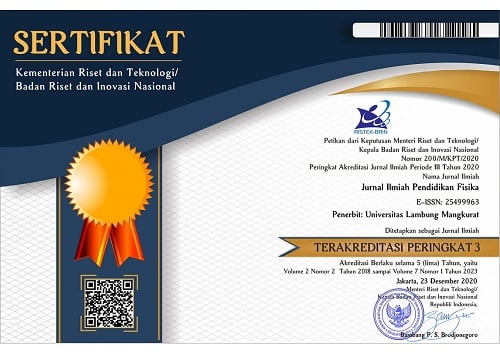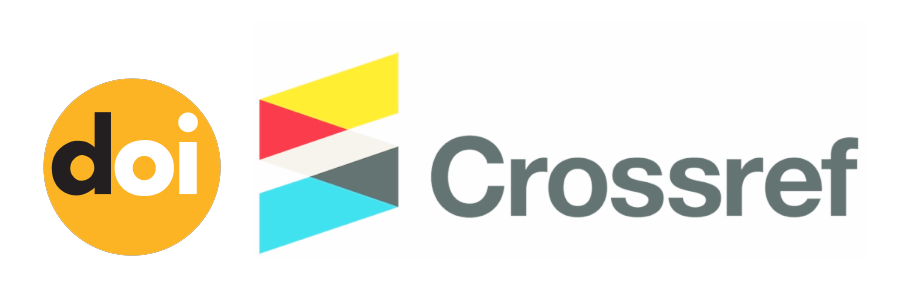Is 21st Century Learning Need STEM Approach built into Physics Comics?
Abstract
This study aims to analyze the effectiveness of using comic teaching materials in physics learning, focusing on the topic of effort and energy. The background of this research is based on the need to improve the quality of physics learning and improve student learning outcomes. In Indonesia's education context, efforts continue to be made to improve STEM-based education (Science, Technology, Engineering, Mathematics) to keep up with the development of the 21st century. In the context of this research, comic teaching materials are used as a new alternative to overcome problems in physics learning. This research was conducted in one of the public high schools in Banjarmasin and used the ADDIE development model (Analysis, Design, Development, Implementation, Evaluation). Data were collected through student learning outcomes tests before and after using comic teaching materials. The results showed that this comic teaching material significantly increased student learning outcomes. Student scores increased from a low of 0.00 to 43.00 and a high of 18.50 to 80.50. This increase in learning outcomes test is included in the medium category. This research contributes to developing comic teaching materials as an effective and innovative learning media in physics learning. It is expected that the results of this study can be a reference for educators and curriculum developers in improving the quality of physics learning in Indonesia. In addition, this research also encourages further development and utilization of creative media in education to increase student motivation and interest in learning.
Keywords
Full Text:
PDFReferences
Aprilia, G. M., Nabila, H., Karomah, R. M., HS, E. I., Permadani, S. N., & Nursyahidah, F. (2023). Development of probability learning media PjBL-STEM based using e-comic to improve students’ literacy numeracy skills. Kreano, Jurnal Matematika Kreatif-Inovatif, 14(1), 160-173.
Artobatama, I. (2018). Pembelajaran stem berbasis outbound permainan tradisional. Indonesian Journal of Primary Education, 2(2), 40-47.
Azizul, A., Riski, W. Y., Fitriyani, D. I., & Sari, I. N. (2020). Pengembangan bahan ajar komik digital pada materi gerak. VOX EDUKASI: Jurnal Ilmiah Ilmu Pendidikan, 11(2), 97–104.
Darmalaksana, W., Hambali, R. Y. A., Masrur, A., & Muhlas. (2020). Analisis pembelajaran online masa WFH pandemic covid- 19 sebagai tantangan pemimpin digital abad 21. Karya Tulis Ilmiah (KTI) Masa Work From Home (WFH) Covid-19 UIN Sunan Gunung Djati Bandung, 1–12.
Eguchi, A. (2016). RoboCupJunior for promoting STEM education, 21st century skills, and technological advancement through robotics competition. Robotics and Autonomous Systems, 75, 692-699.
Guntur, M., Muchyidin, A., & Winarso, W. (2017). Pengaruh penggunaan bahan ajar matematika bersuplemen komik terhadap kemandirian belajar siswa. Eduma : Mathematics Education Learning and Teaching, 6(1), 43.
Hamka, H., & Arsyad, M. N. (2015). Keefektifan penerapan model pembelajaran langsung pada materi sistem gerak di SMA Negeri 1 Donri-Donri. Jurnal Bionature, 16(1), 58–64.
Handayani, T. (2021). Pengembangan media komik digital berbasis STEM untuk meningkatkan literasi sains siswa sekolah dasar. Jurnal Didaktika Pendidikan Dasar, 5(3), 737-756.
Hartini, S., Mariani, I., Misbah, M., & Sulaeman, N. F. (2020). Developing of students worksheets through STEM approach to train critical thinking skills. Journal of Physics: Conference Series, 1567 (4), 042029. IOP Publishing.
Ismail, R. N., & Mudjiran, N. (2019). Membangun karakter melalui Implementasi Teori Belajar behavioristik pembelajaran matematika berbasis kecakapan abad 21. Menara Ilmu, 13(11).
Julian, S. G. (2012). Pengembangan materi pembelajaran. Karya Tulis Ilmiah (KTI) Masa Work From Home (WFH) Covid-19 UIN Sunan Gunung Djati Bandung, 1(1), 1–12.
Kressler, B., & Kressler, J. (2020). Diverse student perceptions of active learning in a large enrollment STEM course. Journal of the Scholarship of Teaching and Learning, 20(1).
Lesmono, A. D., Wahyuni, S., & Alfiana, R. D. N. (2021). Pengembangan bahan ajar fisika berupa komik pada materi cahaya di SMP. Jurnal Pembelajaran Fisika, 1(1), 100-105.
Ndiung, S., & Jediut, M. (2020). Pengembangan instrumen tes hasil belajar matematika peserta didik sekolah dasar berorientasi pada berpikir tingkat tinggi. Premiere Educandum : Jurnal Pendidikan Dasar dan Pembelajaran, 10(1), 94.
Nessa, W., Hartono, Y., & Hiltrimartin, C. (2017). Pengembangan buku siswa materi jarak pada ruang dimensi tiga berbasis science, technology, engineering, and mathematics (STEM) problem- based learning di kelas X. Jurnal Elemen, 3(1), 1.
Noviyanti, N., & Gamaputra, G. (2020). Model pengembangan ADDIE dalam penyusunan buku ajar administrasi keuangan negara (Studi Kualitatif di Prodi D-III Administrasi Negara FISH Unesa). Jurnal Ilmiah Manajemen Publik dan Kebijakan Sosial, 4(2), 100.
Ntobuo, N. E., Arbie, A., & Amali, L. N. (2018). The development of gravity comic learning media based on Gorontalo culture. Jurnal Pendidikan IPA Indonesia, 7(2), 246-251.
Nurdin, E., Saputri, I. Y., & Kurniati, A. (2020). Development of comic mathematics learning media based on contextual approaches. JIPM (Jurnal Ilmiah Pendidikan Matematika), 8(2), 85-97.
Perdana, R., Apriani, A. N., Richardo, R., Rochaendi, E., & Kusuma, C. (2021). Elementary Students' Attitudes towards STEM and 21st-Century Skills. International Journal of Evaluation and Research in Education, 10(3), 1080-1088.
Pratiwi, D. D. (2016). Pembelajaran learning cycle 5E berbantuan geogebra terhadap kemampuan pemahaman konsep matematis. Al-Jabar : Jurnal Pendidikan Matematika, 7(2), 191–202.
Prastowo, A. (2013). Pengembangan Bahan Ajar Tematik Panduan Lengkap Aplikatif. Yogyakarta: Diva Pres.
Putri, S. D., Wijayati, N., Mahatmanti, F. W., & Rachmadiyono, D. (2021). Keefektifan materi ajar penyangga berbasis pemecahan masalah pada kemampuan berpikir kreatif siswa. Jurnal Inovasi Pendidikan Kimia, 15(2), 2864–2872.
Rahmawati ES, Y., & Harta, I. (2014). Keefektifan pendekatan open-ended dan Ctl ditinjau dari hasil belajar kognitif dan afektif. Jurnal Riset Pendidikan Matematika, 1(1), 113.
Rambe, M. (2019). Pelaksanaan supervisi akademik sebagai upaya untuk meningkatkan kompetensi guru dalam menyusun rencana pelaksanaan pembelajaran. Jurnal PAJAR (Pendidikan dan Pengajaran), 3(4), 782-790.
Sari, S. A. (2021). Development of comic-based learning on reaction rate for learning to be more interesting and improving student’s learning outcomes. Jurnal Pendidikan Sains Indonesia (Indonesian Journal of Science Education), 9(1), 151-167.
Sari, F. A., Suseno, N., & Riswanto, R. (2019). Pengembangan modul fisika online berbasis web pada materi usaha dan energi. JIPFRI (Jurnal Inovasi Pendidikan Fisika dan Riset Ilmiah), 3(2), 129–135.
Soemantri, S. (2019). Pelatihan membuat media pembelajaran digital. AKSIOLOGIYA : Jurnal Pengabdian Kepada Masyarakat, 3(1), 64.
Suryani, K., Rahmadani, A. F., Khairudin, K., Aziz, A., & Mawaddah, D. (2023). E-Comic pembelajaran pengolahan sampah berorientasi STEM-MEA bagi siswa sekolah menengah. Edukasi: Jurnal Pendidikan, 21(1), 83-97.
Uskoković, V. (2017). Rethinking active learning as a paradigm of our times: towards poeticizing and humanizing natural sciences in the age of STEM. The Journal of materials education, 39(5-6), 241.
Wahid, A. (2018). Pentingnya media pembelajaran dalam meningkatkan prestasi belajar. Istiqra, 5(2), 1–11.
Wati, M., Ridho, M. H., Misbah, M., & Sasmita, F. D. (2021). Pengembangan materi ajar fisika bermuatan authentic learning pada pokok bahasan gerak melingkar. Jurnal Kependidikan, 5(2), 178-193.
Winarni, E. W., & Koto, I. (2021). Pengembangan media komik digital berbasis STEM dalam meningkatkan kemampuan literasi sains siswa. Jurnal Pembelajaran dan Pengajaran Pendidikan Dasar, 4(2), 22-29.
Wurwiarwin, W., Wahyono, U., & Werdiana, I. K. (2018). Pengembangan komik fisika kontesktual berbasis android pokok bahasan tekanan untuk sekolah menengah pertama. Jurnal Pendidikan Fisika, 6(2), 230-243.
DOI: https://doi.org/10.20527/jipf.v7i2.6780
Refbacks
- There are currently no refbacks.
Indexed by: Jurnal Ilmiah Pendidikan Fisika is licensed under a creative commons attribution-share alike 4.0 international license
Statistics Counter |
















